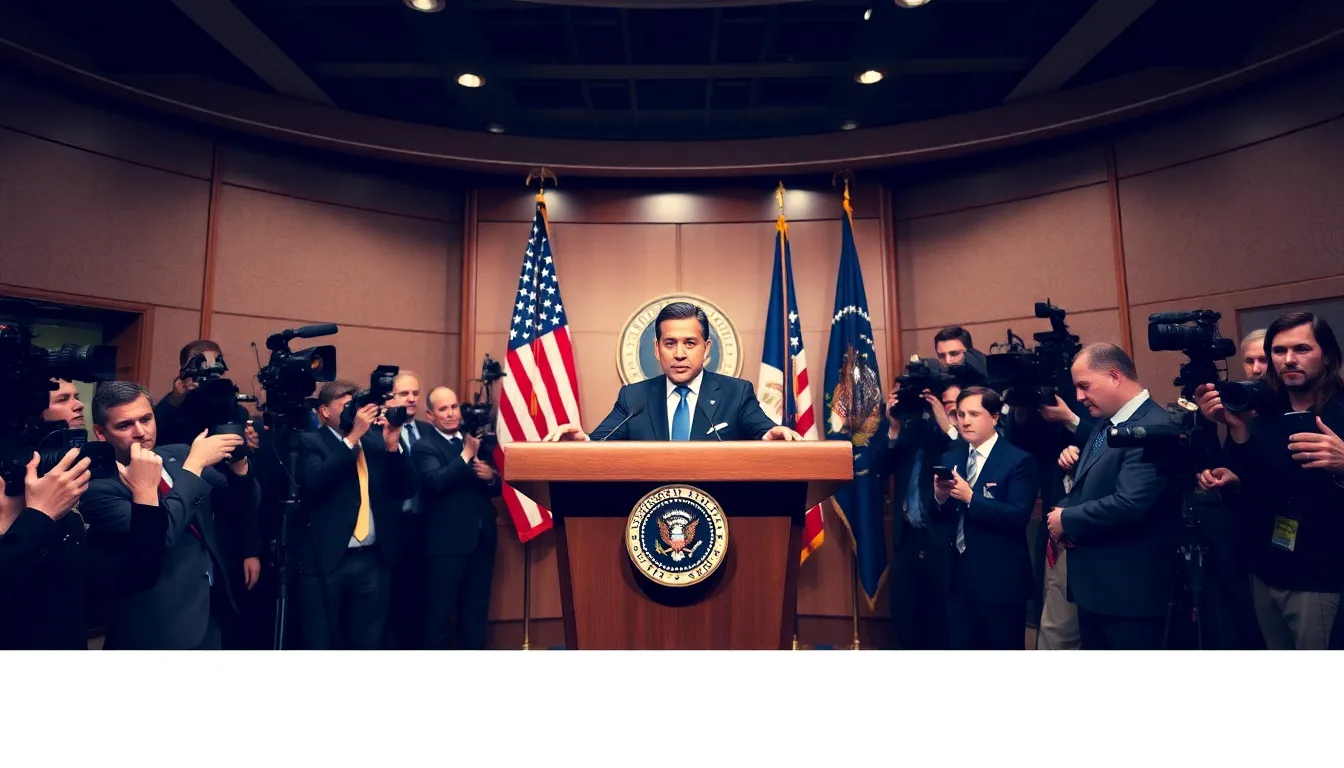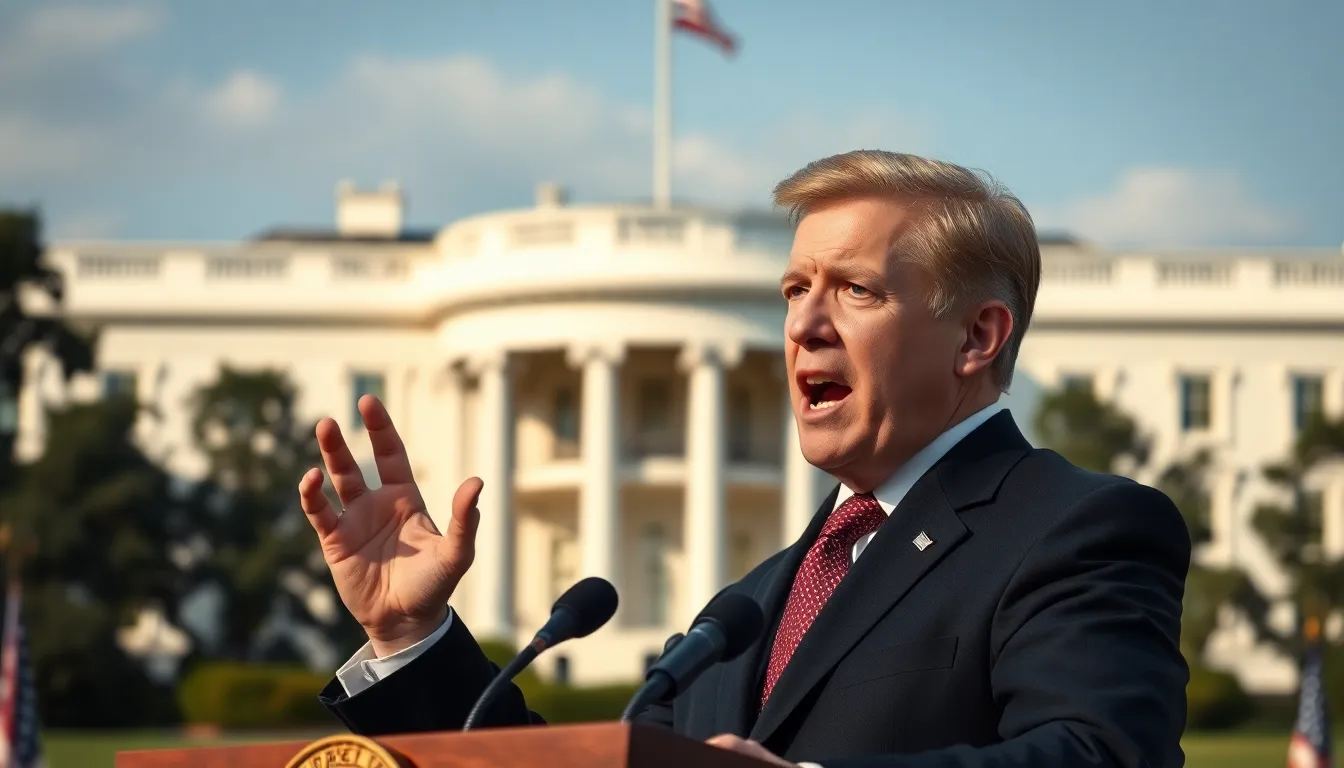In the wild world of political media, few figures stir the pot quite like Alex Jones. Known for his bombastic style and conspiracy-laden rhetoric, he’s carved out a niche that’s both entertaining and polarizing. But what if he traded his microphone for a press secretary podium? Imagine the daily briefings filled with a mix of hard-hitting news and outlandish theories that would leave even seasoned journalists scratching their heads.
As Trump’s press secretary, Jones would surely bring a flair for the dramatic, turning every press conference into a must-watch spectacle. Forget the usual talking points; we’d be treated to a rollercoaster of headlines that could make even the most stoic political analyst chuckle. This article dives into the hypothetical chaos and comedy that could ensue if Alex Jones took on the role of press secretary, blending the absurd with the serious in a way only he can.
Table of Contents
ToggleOverview of Alex Jones and His Influence
Alex Jones stands as a polarizing figure in the realm of media and politics. Known for his provocative commentary and conspiracy theories, he has garnered a substantial following through various platforms, including Infowars. His style combines entertainment with sensationalism, capturing audience attention and stimulating discussion.
Influence extends beyond mere viewership; Jones shapes public discourse on controversial topics. He often emphasizes distrust in mainstream media and government institutions. By doing so, he has inspired both fervent support and intense opposition. His narratives resonate with individuals who feel alienated from conventional political dialogue.
Jones’s impact is particularly notable during major political events. His ability to frame issues in a provocative light alters how audiences perceive and engage with news. Each briefing led by a hypothetical press secretary Jones would likely blend factual reporting with outlandish claims. Media consumption habits could shift in response to such a dynamic approach.
Critics point out that his methods may blur the lines between fact and fiction. Instances of misinformation linked to Jones demonstrate risks associated with his influence. Misinterpretations of fact can lead to public confusion, raising concerns about his role in shaping political narratives.
Overall, the fusion of entertainment and politics seen through Jones encapsulates a broader trend in media. The rise of influencers in political communication highlights changing audience preferences. Press conferences held under his style could redefine traditional expectations, sparking debates on the integrity of information sharing.
The Role of a Press Secretary

A press secretary serves as a vital link between the administration and the public. They ensure accurate messaging while managing media relations.
Responsibilities and Expectations
Press secretaries handle various responsibilities. They prepare and deliver briefings, respond to press inquiries, and manage the flow of information. In this role, maintaining transparency is crucial, as is presenting the administration’s position effectively. They also coordinate with other communications staff for consistent messaging. Furthermore, navigating challenging questions and providing clarity about policies is essential. An effective press secretary builds trust with media representatives while remaining adaptable to shifting political landscapes.
Historical Context of Press Secretaries
The role of press secretaries dates back to the early 20th century. George E. McLellan served as a press secretary for President Franklin D. Roosevelt, laying groundwork for modern practices. Over the decades, this position has evolved, reflecting changes in media and public engagement. Notably, press secretaries like Ronald Reagan’s James Brady faced intense scrutiny during major events. These historical figures shaped expectations surrounding transparency and information dissemination. The influence of social media further transformed the role, pushing press secretaries to adapt quickly to real-time news cycles.
Alex Jones’ Connection to Trump Administration
Alex Jones has become a notable figure in discussing the Trump administration and its dynamics. His media presence intertwines with political events, often reflecting a controversial approach.
Key Events and Controversies
Several key events highlight Jones’s connection to the Trump administration. During the 2016 presidential campaign, he endorsed Donald Trump, significantly boosting his visibility in conservative circles. His appearance at a rally in 2017 garnered attention, as he vocally supported the administration’s policies. Subsequently, Jones faced backlash over his claims regarding incidents like the Parkland shooting, leading to accusations of promoting conspiracy theories. Such controversies often overlapped with political narratives, influencing perceptions around Trump and his administration’s communication strategies.
Impact on Public Perception
Jones’s presence has significantly influenced public perception regarding the Trump administration. His commentary resonates with individuals skeptical of mainstream media narratives. As a result, many followers perceive Jones as a counterbalance to established political discourse. This alignment contributes to the polarization of opinions, where supporters view him as an advocate for their beliefs, while opponents label him as a source of misinformation. Thus, his role shapes how supporters and detractors interpret political events, further complicating the dialogue surrounding the Trump administration.
The Implications of Jones’ Statements
Alex Jones’s statements have sparked significant reactions in both media and political arenas. These implications highlight the complexities surrounding his divisive persona.
Media Reactions and Coverage
Media outlets often approach Jones’s commentary with scrutiny. Reports frequently describe his statements as outrageous and alarmist. Coverage typically focuses on the consequences of his claims, especially concerning sensitive events. Journalists emphasize the challenge of distinguishing fact from fiction in his narratives. Many take a critical stance, questioning how his influence shapes public perception. Others examine the sensationalism surrounding his messages. Debates also arise regarding the ethics of broadcasting controversial figures, highlighting the struggle to maintain responsible journalism.
Political Ramifications
Political responses to Jones’s statements vary widely. Some politicians embrace his alignment with certain voter bases, leveraging his support to bolster their campaigns. Alternatively, others condemn his rhetoric, citing potential damage to political discourse. His influence often reshapes narratives about key political issues. Administration officials face pressure to distance themselves from his more extreme claims, reflecting concerns about public trust. The resulting polarization complicates bipartisan dialogue, as some constituents view his commentary as an authentic voice while others consider it a harmful distraction. Ultimately, the political landscape adapts to the enduring effects of Jones’s statements.
The hypothetical scenario of Alex Jones as a press secretary underscores the complexities of modern political communication. His blend of entertainment and controversy could redefine how information is shared and perceived. While some may find humor in his approach, the potential for confusion and misinformation raises significant concerns.
Jones’s influence illustrates the challenges faced by traditional media and political figures in navigating a polarized landscape. As he continues to shape public discourse, the implications of his style resonate beyond the press room, affecting how audiences engage with news and political narratives. The evolving role of press secretaries must adapt to these dynamics, ensuring that transparency and accuracy remain at the forefront of political communication.


